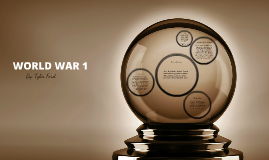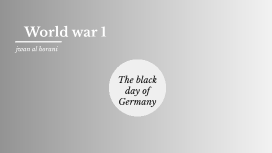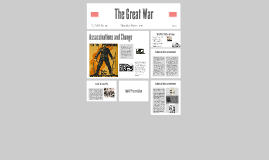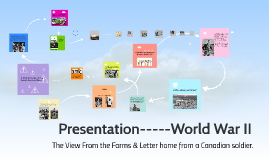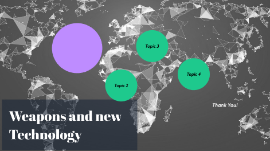World War 1 Presentation
Transcript: Economically and Politically Unstable Germany: Rising to power in an economically and politically unstable Germany, Adolf Hitler and his National Socialist (Nazi Party) rearmed the nation and signed strategic treaties with Italy and Japan to further his ambitions of world domination. World War II begins. President Wilson received strong support when he announced a policy of "Neutrality". He urged all Americans to be "neutral in fact as well as in name, to be impartial in thought as well in action". Wilson hoped that the United States would be able to negotiate a settlement to the conflict. He pursued this goal throughout 1915 and 1916, but without success. The U.S. remained neutral in action, but few of its citizens were impartial in thought. Some 28 million Americans...this was nearly 30 percent of the population were either immigrants or the children of immigrants. Some Americans of Austrian, German, Hungarian or Turkish backgrounds sympathized with the Central Powers. Many more backed the Allies because of common language and culture which bound us back to Great Britain. World War I Pilot Aces Manfred von Richthofen (German Red Baron) Edward "Eddie" Rickenbacker (American) Militarism, Alliances, Nationalism and Imperialism Surrender, Reparations and Psychological Effects Germany (1917): The Germans surrendered and signed the "Treaty of Versailles" in Paris. This document had a clause in it "War Guilt Clause", which spelled out that Germany took all of the blame for the war and would pay for all damages to property in the form of "Reparations". Psychological Effects: Psychological effects after the war did not stop with the signing with the "Treaty of Versailles". Political, Cultural, and Social Order Strategies of Germany's Military Austria-Hungary quickly declare war on Serbia. Germany immediately offered its support from Kaiser Wilhelm II Ruler of Germany. Russia, with a large Slav population of its own , was compelled to honor its alliance with Serbia. The Allied Powers of Britain, France and Russia were up against the Central Powers of Germany, Austria-Hungary, the Ottoman Empire, and Bulgaria. Italy remained neutral until 1915, the U.S. until 1917 both joined the Allied Powers. Eventually some 30 nations took sides in what became know as the "Great War". Mustard Gas (Poison) Submarines Gas Masks British Tank Trench Warfare Twentieth Century World History Causes of World War l Militarism: The mindset of relying on ones military power and being prepared for aggressive attacks. Having a standing army, navy, for the purposes of defending the nation/country from invaders....Mobilization. Alliances: These alliances were made in attempt to protect themselves from invasion by hostile countries or groups. Examples are: "Triple Entente Countries" Britain, France, Russia "Triple Alliance Countries" Austria-Hungry, Germany, Italy Nationalism: This led to increase competition between the nations of Europe. Imperialism: Which led to resentment amongst smaller European countries References United States Enters the War in Europe April 6, 1917. For these reasons: RMS Lusitania: On May 7, 191 less than a year after World War I (1914-1918) erupted across Europe, a German U-Boat torpedoed and sank the RMS Lusitania, a British ocean liner en route from New York to Liverpool, England. A civilian passenger liner with 1900 passengers and crew perished with over 1,100 civilians/crew including amongst the dead were 128 Americans. Zimmerman Note: A secret telegram sent on January 16, 1917, by German Foreign Secretary Arthur Zimmerman to Count Johann Von Bernstorf, the German Ambassador to the U.S. In it Zimmerman, said that in the event of war with the U.S., Mexico should be asked to enter the war as a German ally, in turn Germany promised to re-patriot to Mexico the lost territories of Texas, New Mexico, Arizona. British intelligence intercepted and deciphered the telegram and sent it to President Wilson, who released it on March 1, 1917 to the press. These two events led to the turn of U.S. public opinion against Germany during WWI, and strengthened the advocates of U.S. entry into the war. War was declared by the Senate on April 4, 1917. and the House two days later. www.history.com.lusitnia United States Home Front Prior to World War I and During the War War Reaches a Stalemate World War 1 World War I/Video-History.com www.history.com/topics/world-wari/videos Updated: Feb 26, 2010. World War I-History.com Articles, Videos, Pictures and Facts www.history.com/topics/world-war-i The Causes and Effects of World War I www.essaypedia.com [PDF] WWI: Causes and Effect - University of South Carolina Libraries library.sc.edu/blogs/academy/files/.../WWI-Cause-and-Effect-7-5.11. pdfThe Great War . Educational Resources . Lesson Plan 1 | PBS www.pbs.org/greatwar/resources/lesson1.html Findley, C.V. & Rothney, J.A. (2011). Twentieth-century world. (7th ed.), Wadsworth Publishing Company, Inc., New York, NY. Franz Joseph June 1914-






